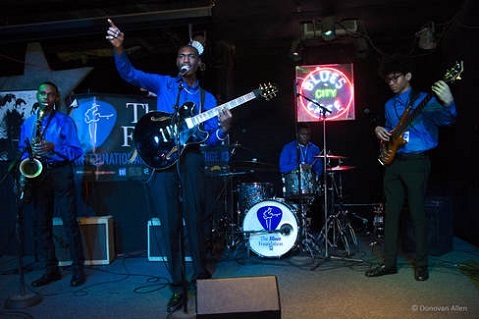Music has always been an integral part of human civilization, دانلود موزیک آلترناتیو راک transcending time, culture, and language. From the first rhythmic beats tapped on primitive instruments to the sophisticated compositions of modern-day artists, music has woven its way into the fabric of society, providing an outlet for expression, connection, and transformation. This article explores the evolution of music, its impact on society, and how it continues to shape human culture.
The Origins of Music
The earliest forms of music likely began with the natural sounds of the environment—birds singing, wind howling, and water flowing. Early humans mimicked these sounds, using their voices and rudimentary instruments such as drums, flutes, and strings made from animal sinews. Music in these forms served practical purposes—marking the changing of seasons, accompanying rituals, or communicating over distances.
As societies began to develop, so did their musical traditions. Ancient civilizations such as Mesopotamia, Egypt, and Greece cultivated structured systems of music, with written notation and the invention of more complex instruments. For example, the Greeks introduced the concept of scales, which later evolved into the Western musical notation system we use today.
The Classical Era: Structure and Innovation
The Classical era, spanning roughly from the 17th to the early 19th century, brought a new level of sophistication to music. Composers like Johann Sebastian Bach, Wolfgang Amadeus Mozart, and Ludwig van Beethoven are considered the giants of this period, creating symphonies, operas, and concertos that remain central to the classical music repertoire.
During this time, music became more formalized, with complex harmonic structures and an emphasis on melody and orchestration. The orchestra as we know it today was refined, with instruments like the violin, cello, and piano becoming integral to compositions. The balance of formality and emotion found in classical compositions created a universal language of sound that resonated deeply with listeners.
The Rise of Popular Music: From Folk to Rock ‘n’ Roll
While classical music was the cornerstone of formal Western culture, the evolution of popular music began to take shape in parallel. Folk music, blues, jazz, and gospel—genres rooted in community and personal experience—began to emerge in the 19th and early 20th centuries. These genres were often performed by everyday people, reflecting the lives and struggles of those who created them.
The 20th century witnessed the explosion of popular music, driven largely by technological advances in recording and radio broadcasting. In the 1920s, jazz became a global sensation, with artists like Louis Armstrong and Duke Ellington redefining what music could be. The late 1940s and 1950s brought the birth of rock ‘n’ roll, a genre that fused rhythm and blues with country, resulting in the rise of iconic figures such as Elvis Presley, Chuck Berry, and Little Richard.
Rock ‘n’ roll marked a shift in the cultural landscape, as music became a form of rebellion, self-expression, and identity for the youth. This movement laid the groundwork for the diverse range of genres that followed, including punk, metal, hip-hop, and electronic dance music (EDM), all of which continue to evolve and impact the music industry today.
Music’s Societal Impact
Music is not just entertainment; it is a powerful force that can inspire social change, reflect societal values, and create a sense of community. Throughout history, music has been used as a tool for protest, solidarity, and resistance. Songs like Bob Dylan’s “The Times They Are A-Changin'” and Marvin Gaye’s “What’s Going On” became anthems of the civil rights movement and the anti-Vietnam War protests of the 1960s and 70s.
Music also plays a significant role in personal identity formation, allowing individuals to express their emotions, beliefs, and desires. The rise of subcultures such as punk rock, hip-hop, and rave culture in the late 20th century showed how music could define social groups and create a sense of belonging among people who felt marginalized or different.
Furthermore, music’s ability to evoke deep emotional responses—from joy and nostalgia to sorrow and reflection—has made it an essential part of personal rituals, celebrations, and milestones. Weddings, funerals, graduations, and birthdays are all accompanied by music that helps shape the emotional atmosphere of these events.
Technology and the Future of Music
The digital age has revolutionized the music industry in ways previously unimaginable. The advent of the internet and streaming services has made music more accessible than ever before, enabling artists to reach global audiences without the need for traditional record labels. Music production software, once limited to professionals in large studios, is now available to anyone with a computer, democratizing music creation.
At the same time, advancements in artificial intelligence (AI) and machine learning have led to the development of music-generating algorithms and AI-assisted tools that help musicians compose and produce music. While some argue that AI could replace human creativity, others see it as a tool that enhances the artistic process, allowing musicians to push the boundaries of what is possible.
The future of music is also intertwined with new ways of experiencing it. Virtual reality (VR) concerts, immersive soundscapes, and interactive music platforms are just the beginning of a new era in music consumption. As technology continues to evolve, so too will the way we create, share, and enjoy music.
Conclusion
Music is an ever-evolving art form that reflects the complexities of human existence. From ancient rhythms to digital soundscapes, it has provided a means of expression, connection, and innovation for millennia. As we look toward the future, one thing remains certain: music will continue to shape our cultures, tell our stories, and speak to the deepest parts of who we are.
In a world where we are often divided by geography, language, and belief, music stands as a universal bridge—connecting hearts and minds across boundaries, inspiring change, and reminding us of our shared humanity.

